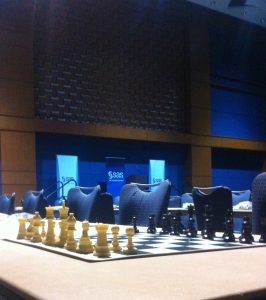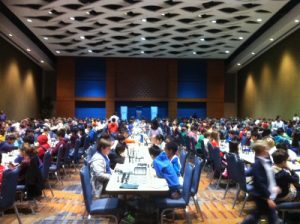 Imagine this: hundreds of fun-loving K-12 students excitedly converge in a large ballroom for their weekend adventure. They are mostly elementary school students and there is no shortage of kindergartners. The day's fun? Quietly solving and creating Renaissance-era logical and mathematical puzzles! Some pairs of puzzle solvers will concentrate for an hour or more as the long series of puzzles vary from strategic to tactical to geometric and mathematical.
Imagine this: hundreds of fun-loving K-12 students excitedly converge in a large ballroom for their weekend adventure. They are mostly elementary school students and there is no shortage of kindergartners. The day's fun? Quietly solving and creating Renaissance-era logical and mathematical puzzles! Some pairs of puzzle solvers will concentrate for an hour or more as the long series of puzzles vary from strategic to tactical to geometric and mathematical.
As a bonus to all of the fun, this day's hard play helps them be more successful at Science, Technology, Engineering and Mathematics (STEM) education. So does all the preparation prior to this big day. The Renaissance-era scholars of this activity could scarcely envision the technology these kids have in their backpacks, much less what they may invent in just a few years' time.
The fun can't start until the parents and other ancillary grown-ups are shown out of the great hall. Then it gets quiet -- all you can hear is the pressing of the buttons on the chess clocks, a 19th-century invention. Each pair of intrepid mathematical explorers are playing a chess game that, in all likelihood, has never been played before in history. It’s a scholastic chess tournament, and it is a weekend enrichment activity like no other.
In North Carolina, the premier scholastic chess tournament each year is the NC K-12 Chess Championship, a weekend-long United States Chess Federation (USCF) rated event that is being hosted this year by the Charlotte Chess Center & Scholastic Academy in Charlotte, N.C. from Feb 14th – Feb 15th. SAS is proud to sponsor this event again because chess helps prepare students for STEM education.
Time and again, research has found that scholastic chess play helps with mathematics, logical and critical thinking, creative problem solving and even reading. As players improve their chess rating, they are rewarded for hard work and study, more than for any kind of innate chess talent. Like any pursuit of excellence, competitive scholastic chess players learn important life skills as well -- including the thrill of victory, the agony of defeat and the ambiguity of the draw.
 Oftentimes, new players discover chess because they have a scholastic chess club at their school. Typically, these clubs are organized by parent volunteers, like at my neighborhood elementary school. Though some schools may be lucky enough to have a Master or even a Grandmaster as a coach, more often the volunteer coaches aren't active highly-rated tournament players possessing world-beating chess knowledge. What they do know is that chess gives their schools' students a fun and engaging way to develop invaluable skills.
Oftentimes, new players discover chess because they have a scholastic chess club at their school. Typically, these clubs are organized by parent volunteers, like at my neighborhood elementary school. Though some schools may be lucky enough to have a Master or even a Grandmaster as a coach, more often the volunteer coaches aren't active highly-rated tournament players possessing world-beating chess knowledge. What they do know is that chess gives their schools' students a fun and engaging way to develop invaluable skills.
On Feb. 15, the 2015 NC scholastic chess champions will stand on a stage in Charlotte and receive our congratulations. But they are not the only ones we should recognize. In addition to all of the players taking up the challenge of competitive chess play, we should congratulate all of the parent volunteers and others that bring chess to new players at their schools. Win, lose or draw, young chess players are developing skills that will help them with STEM education and beyond. Chess helps prepare them for the economy of the future, and that will make a better future for all of us.
Interested in launching a chess club at a local school? Read about how a parent with limited chess knowledge started an elementary school chess club in Oklahoma. Need to explain to your school why it should have a chess club? Check out my post, "Scholastic chess clubs: 10 reasons why," and this short TEDx talk, "How Chess Can Revolutionize Learning: Cody Pomeranz at TEDxYale."
Thanks are due to The Yamie Chess project, a supplementary K-8 math learning program based on classic chess that strives "to help children master the prerequisite and specific mathematical thinking tools they will need for later study in STEM," which maintains a great web page that links to a lot of research about scholastic chess.

1 Comment
What a timely and inspiring article... my son has his first chess club session as a K student at school today!